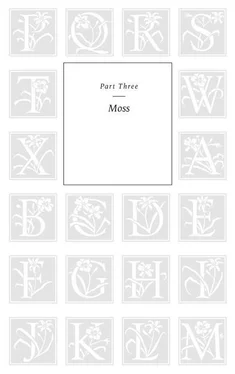Vanessa Diffenbaugh - The Language of Flowers
Здесь есть возможность читать онлайн «Vanessa Diffenbaugh - The Language of Flowers» весь текст электронной книги совершенно бесплатно (целиком полную версию без сокращений). В некоторых случаях можно слушать аудио, скачать через торрент в формате fb2 и присутствует краткое содержание. Жанр: Старинная литература, на английском языке. Описание произведения, (предисловие) а так же отзывы посетителей доступны на портале библиотеки ЛибКат.
- Название:The Language of Flowers
- Автор:
- Жанр:
- Год:неизвестен
- ISBN:нет данных
- Рейтинг книги:4 / 5. Голосов: 1
-
Избранное:Добавить в избранное
- Отзывы:
-
Ваша оценка:
- 80
- 1
- 2
- 3
- 4
- 5
The Language of Flowers: краткое содержание, описание и аннотация
Предлагаем к чтению аннотацию, описание, краткое содержание или предисловие (зависит от того, что написал сам автор книги «The Language of Flowers»). Если вы не нашли необходимую информацию о книге — напишите в комментариях, мы постараемся отыскать её.
The Language of Flowers — читать онлайн бесплатно полную книгу (весь текст) целиком
Ниже представлен текст книги, разбитый по страницам. Система сохранения места последней прочитанной страницы, позволяет с удобством читать онлайн бесплатно книгу «The Language of Flowers», без необходимости каждый раз заново искать на чём Вы остановились. Поставьте закладку, и сможете в любой момент перейти на страницу, на которой закончили чтение.
Интервал:
Закладка:
Walking down Fell, I turned onto Market. My steps slowed as I reached a busy intersection, unsure of where to go. Any other day I would have plucked annuals from Duboce Park, scoured the overgrown lot at Page and Buchanan, or stolen herbs from the neighborhood market. For most of a decade I’d spent every spare moment memorizing the meanings and scientific descriptions of individual flowers, but the knowledge went mostly unutilized. I used the same flowers again and again: a bouquet of marigold, grief; a bucket of thistle, misanthropy; a pinch of dried basil, hate . Only occasionally did my communication vary: a pocketful of red carnations for the judge when I realized I would never go back to the vineyard, and peony for Meredith, as often as I could find it. Now, searching Market Street for a florist, I scoured my mental dictionary.
After three blocks I came to a liquor store, where paper-wrapped bouquets wilted in buckets under the barred windows. I paused in front of the store. They were mostly mixed arrangements, their messages conflicting. The selection of solid bouquets was small: standard roses in red and pink, a wilting bunch of striped carnations, and, bursting from its paper cone, a cluster of purple dahlias. Dignity . Immediately, I knew it was the message I wanted to give. Turning my back to the angled mirror above the door, I tucked the flowers inside my coat and ran.
I was out of breath by the time I returned to the house. The living room was empty, and I stepped inside to unwrap the dahlias. The flowers were perfect starbursts, layers of white-tipped purple petals unfurling from tight buds of a center. Biting off an elastic band, I detangled the stems. The girls would never understand the meaning of the dahlias (the meaning itself an ambiguous statement of encouragement); even so, I felt an unfamiliar lightness as I paced the long hall, slipping a stem under each closed bedroom door.
The remaining flowers I gave to the young woman who’d worked the night shift. She was standing by the kitchen window, waiting for her replacement.
“Thank you,” she said when I handed her the bouquet, confusion in her voice. She twirled the stiff stems between her palms.
Meredith arrived at ten o’clock, as she’d told me she would. I waited on the front porch, a cardboard box balanced on my thighs. In eighteen years I’d collected mostly books: the Dictionary of Flowers and Peterson Field Guide to Pacific States Wildflowers , both sent to me by Elizabeth a month after I left her home; botany textbooks from libraries all over the East Bay; thin paperback volumes of Victorian poetry stolen from quiet bookstores. Stacks of folded clothes covered the books, a collection of found and stolen items, some that fit, many that did not. Meredith was taking me to The Gathering House, a transitional home in the Outer Sunset. I’d been on the waiting list since I was ten.
“Happy birthday,” Meredith said as I put my box on the backseat of her county car. I didn’t say anything. We both knew that it might or might not have been my birthday. My first court report listed my age as approximately three weeks; my birth date and location were unknown, as were my biological parents. August 1 had been chosen for purposes of emancipation, not celebration.
I slunk into the front seat next to Meredith and closed the door, waiting for her to pull away from the curb. Her acrylic fingernails tapped against the steering wheel. I buckled my seat belt. Still, the car did not move. I turned to face Meredith. I had not changed out of my pajamas, and I pulled my flannel-covered knees up to my chest and wrapped my jacket around my legs. My eyes scanned the roof of Meredith’s car as I waited for her to speak.
“Well, are you ready?” she asked.
I shrugged.
“This is it, you know,” she said. “Your life starts here. No one to blame but yourself from here on out.”
Meredith Combs, the social worker responsible for selecting the stream of adoptive families that gave me back, wanted to talk to me about blame.
2 .
I pressed my forehead against the window and watched the dusty summer hills roll past. Meredith’s car smelled like cigarette smoke, and there was mold on the strap of the seat belt from something some other child had been allowed to eat. I was nine years old. I sat in the backseat of the car in my nightgown, my cropped hair a tangled mess. It was not the way Meredith had wanted it. She’d purchased a dress for the occasion, a flowing, pale blue shift with embroidery and lace. But I had refused to wear it.
Meredith stared at the road ahead. She didn’t see me unbuckle my seat belt, roll down the window, and stick my head out until my collarbone pressed against the top of the door. Tilting my chin up into the wind, I waited for her to tell me to sit down. She glanced back at me but didn’t say anything. Her mouth remained a tight line, and I couldn’t see her expression underneath her sunglasses.
I stayed this way until Meredith touched a button on her door that made the window rise an inch without warning. The thick glass pressed into my outstretched neck. I flew back, bouncing off the seat and sinking down onto the floor. Meredith continued to raise the window until the wind rushing through the car was replaced by silence. She did not look back. Curling up on the dirty carpet, I pulled a rancid baby bottle from deep beneath the passenger seat and threw it at Meredith. It hit her shoulder and flew back at me, leaking a sour puddle onto my knees. Meredith didn’t flinch.
“Do you want peaches?” she asked.
Food was something I could never refuse, and Meredith knew it.
“Yes.”
“Then get in your seat, buckle your seat belt, and I’ll buy you whatever you want at the next fruit stand we pass.”
I climbed onto the seat and pulled the seat belt across my waist.
Fifteen minutes passed before Meredith pulled off the freeway. She bought me two peaches and a half-pound of cherries, which I counted as I ate.
“I’m not supposed to tell you this,” Meredith began as we turned back onto the road. Her words were slow, the sentence drawn out for effect. She paused and glanced back at me. I held my gaze out the window and rested my cheek against the glass, unresponsive. “But I think you deserve to know. This is your last chance. Your very last chance, Victoria—did you hear me?” I didn’t acknowledge her question. “When you turn ten, the county will label you unadoptable, and even I won’t keep trying to convince families to take you. It’ll be group home after group home until you emancipate if this doesn’t work out—just promise me you’ll think about that.”
I rolled down the window and spit cherry seeds into the wind. Meredith had picked me up from my first stay at a group home just an hour before. It struck me that my placement in the home might have been purposeful—in preparation for this exact moment. I hadn’t done anything to get kicked out of my last foster home, and I was in the group home only a week before Meredith came to take me to Elizabeth.
It would be just like Meredith , I thought, to make me suffer to prove her point . The staff at the group home had been cruel. Every morning the cook made a fat, dark-skinned girl eat with her shirt pulled up around her neck, her bulging belly exposed, so she would remember not to eat too much. Afterward, the housemother, Miss Gayle, chose one of us to stand at the head of the long table and explain why our family didn’t want us. Miss Gayle picked me only once, and since I was abandoned at birth, I got away with saying “My mother didn’t want a baby.” Other girls told stories of the awful things they’d done to siblings, or why they were responsible for their parents’ drug addictions, and almost always they cried.
Читать дальшеИнтервал:
Закладка:
Похожие книги на «The Language of Flowers»
Представляем Вашему вниманию похожие книги на «The Language of Flowers» списком для выбора. Мы отобрали схожую по названию и смыслу литературу в надежде предоставить читателям больше вариантов отыскать новые, интересные, ещё непрочитанные произведения.
Обсуждение, отзывы о книге «The Language of Flowers» и просто собственные мнения читателей. Оставьте ваши комментарии, напишите, что Вы думаете о произведении, его смысле или главных героях. Укажите что конкретно понравилось, а что нет, и почему Вы так считаете.












